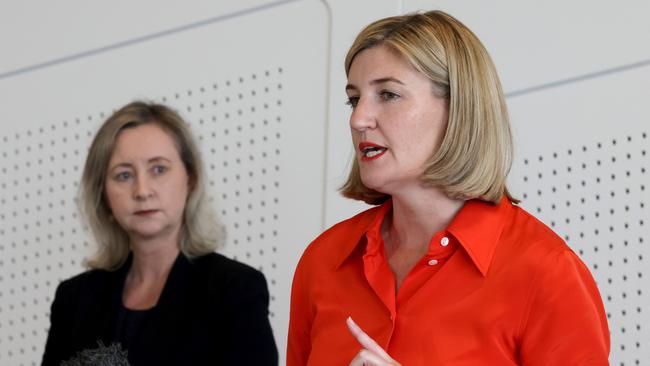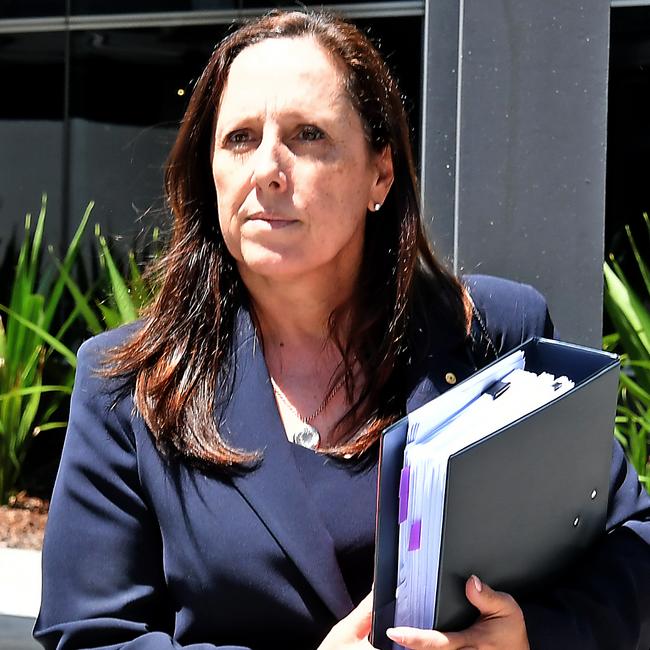103k samples to be retested as DNA lab culture blamed
More than 100,000 DNA samples tested using a “fatally flawed” process within the state’s scandal-plagued forensics lab resulted in critical criminal evidence being missed – but no individual was to blame, a report has found.

QLD Politics
Don't miss out on the headlines from QLD Politics. Followed categories will be added to My News.
More than 100,000 DNA samples tested using a “fatally flawed” process within the state’s scandal-plagued forensics lab resulted in critical criminal evidence being missed – but no individual was to blame – a damning commission of inquiry report has revealed.
The second commission of inquiry into the state-run forensic lab issued a scathing criticism of an automated DNA extraction system, known as Project 13, revealing it extracted “less DNA than comparable methods” and was not “scientifically validated for use”.
Nobody will lose their jobs, however, with the review led by Annabelle Bennett finding new forensics chief executive officer Linzi Wilson-Wilde did not deliberately mislead the first commission of inquiry when she failed to raise evidence about the failed extraction method.
Her omission and advocacy by forensic scientist Kirsty Wright prompted the second commission of inquiry, which found the automated DNA extraction process used between October 2007 and November 2016 was “fatally flawed”.
“Samples that were subject to this method of extraction that recorded insufficient DNA for further testing may well have contained sufficient DNA for forensic purposes,” the report revealed.
“It goes without saying that the evidence available for criminal trials may thus have been compromised and convictions that could have otherwise been secured did not occur.”
Up to 103,187 samples may be retested and will form part of the historical review of cases under way – which now totals about 37,000.
Health Minister Shannon Fentiman said the DNA lab had failed in its most basic responsibility. “The DNA lab really did away with scientifically sound methodology,” she said.
“They sacrificed that for speed.”
Dr Bennett’s review – which contains two recommendations – was released by Ms Fentiman and Attorney-General Yvette D’Ath on Monday after being presented at Cabinet.
It calls for samples tested by the Automated DNA IQ Method between October 29, 2007 and November 21, 2016 to be retested, noting “no faith can be placed in results”.
The review makes no finding against Dr Wilson-Wilde, but notes the latest commission of inquiry did not enable “a full examination of the roles of any of the individuals within the hierarchy of the Queensland Health Forensic and Scientific Services”.
Dr Wilson-Wilde admitted during the inquiry she “perhaps could have been clearer” in alerting the first commission of inquiry about the catastrophic failings of an extraction method that cast doubt over tens of thousands of rape and murder cases.
“There is no evidence to support concern for the online work of Forensic Services Queensland under her direction and under the internal supervision of the interim FSQ advisory board and of Queensland Health,” the second inquiry found.
Ms Fentiman noted it found no fault with any individual, but noted the “overall lack of governance within the lab” was to blame for Project 13.
She defended Dr Wilson-Wilde and said there was “no deliberate misleading” during the first inquiry.
“Commissioner Bennett has found that there is a lot of great work being done and that there is nothing that should undermine Queenslanders’ confidence in the lab,” Ms Fentiman said.
“It’s a herculean effort to be able to overhaul a culture, put in place all of these new processes and procedures and get the retesting under way.”
Ms Fentiman said the work Dr Wilson-Wilde had undertaken would ensure Queensland had the world’s best DNA lab, despite scientists who worked in the lab during the Project 13 debacle still being employed.
“Those particular scientists were raising issues but there were no processes in place to be able to have that well ventilated and to have the science robustly debated in any way,” Ms Fentiman said.
“That was just the culture of the lab, you may have raised a concern but it was shut down immediately.”
The state will rush through amendments in the next sitting of parliament next week to amend the law allowing it to keep forensic samples longer, owing to the “delay” inevitably caused by the retesting of 103,000 samples.
Current laws require samples taken from a suspect in an indictable offence to be destroyed after a year if proceedings have not been commenced.
The amendments will extend the time period to three years to ensure testing can be conducted amid the backlog.
Queensland will also continue to rely on New Zealand, the UK, other states and the Australian Defence Force to assist with DNA and bone testing.
Opposition Leader David Crisafulli said only “public outcry” forced the state government to hold the two commissions of inquiry into the forensic lab.
“Today’s revelations undermine the foundations of our justice system in Queensland and have vast impacts for victims across our state,” he said.
“Any response today should have put victims front and centre, but instead we saw a government more interested in telling Queenslanders to move on.”
The state government will also introduce a Bill next week to establish the position of Director of Forensic Science Queensland.






